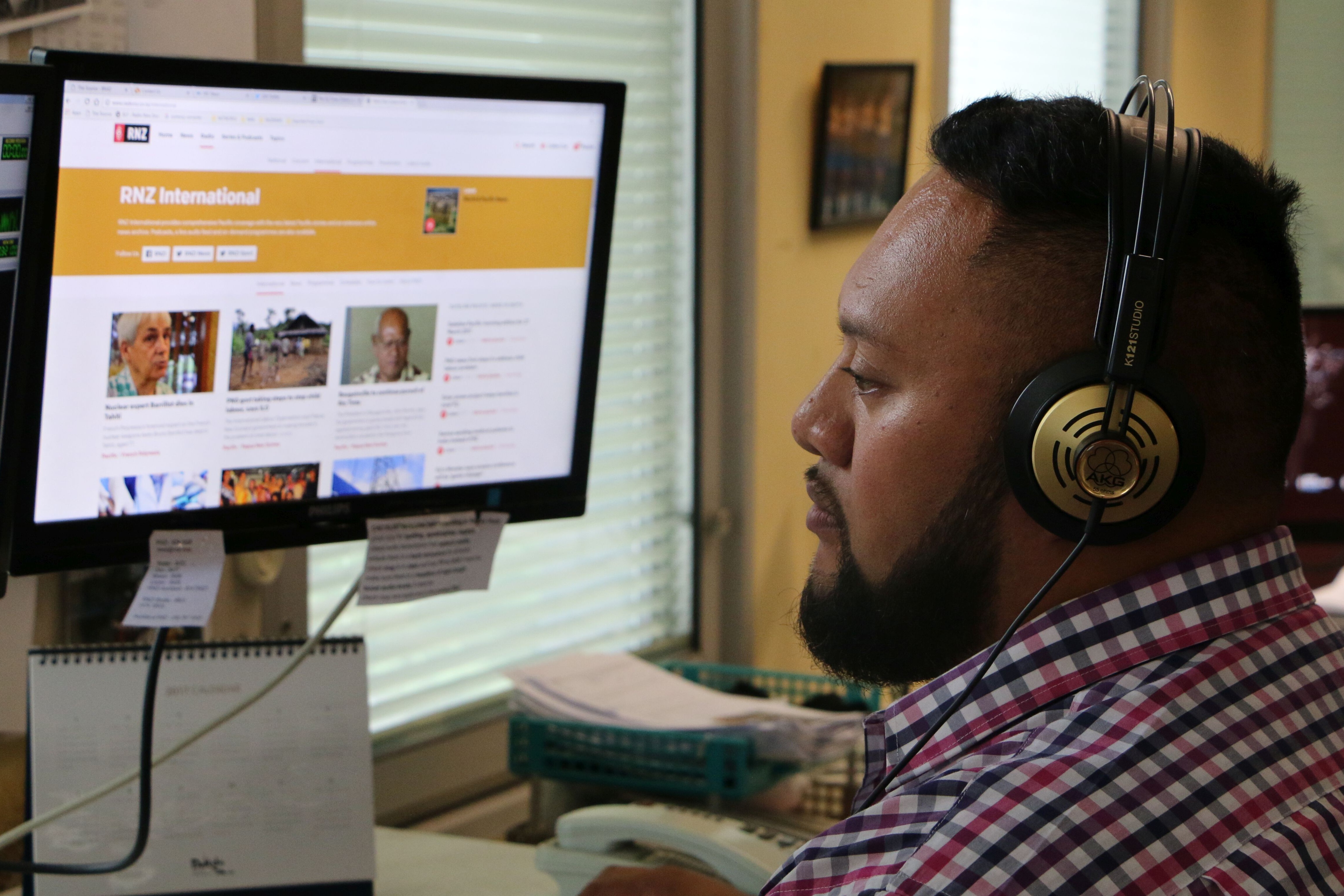Apply now for our 2017 Travel Bursary scheme
This year we have helped ten employees from our member broadcasters to exchange ideas and skills in other countries for up to two weeks as part of our travel bursary programme.
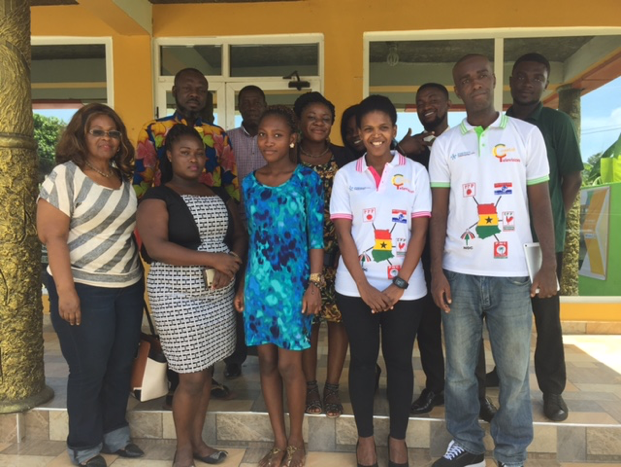
The bursaries have been a great success, allowing bursars to receive training, gain new experiences and forge future alliances that may not otherwise be possible.
This year’s intake included senior media professionals in search of new technologies through which to target their audiences, journalists exploring new methods of reporting and sharing stories, and producers looking to increase cultural diversity in their output.
Beyond skill development and networking, the bursary was also aimed at encouraging bursars to work on projects that promote Millennium & Sustainable Development Goals as well as developing better ways of exercising freedom of expression.
The Public Media Alliance (PMA) is grateful to the BBC Grace Wyndham Goldie Trust for their continued support for these bursaries and supporting the values of Public Service Broadcasting.
So, what have our bursars been up to?
Nakasia Logan
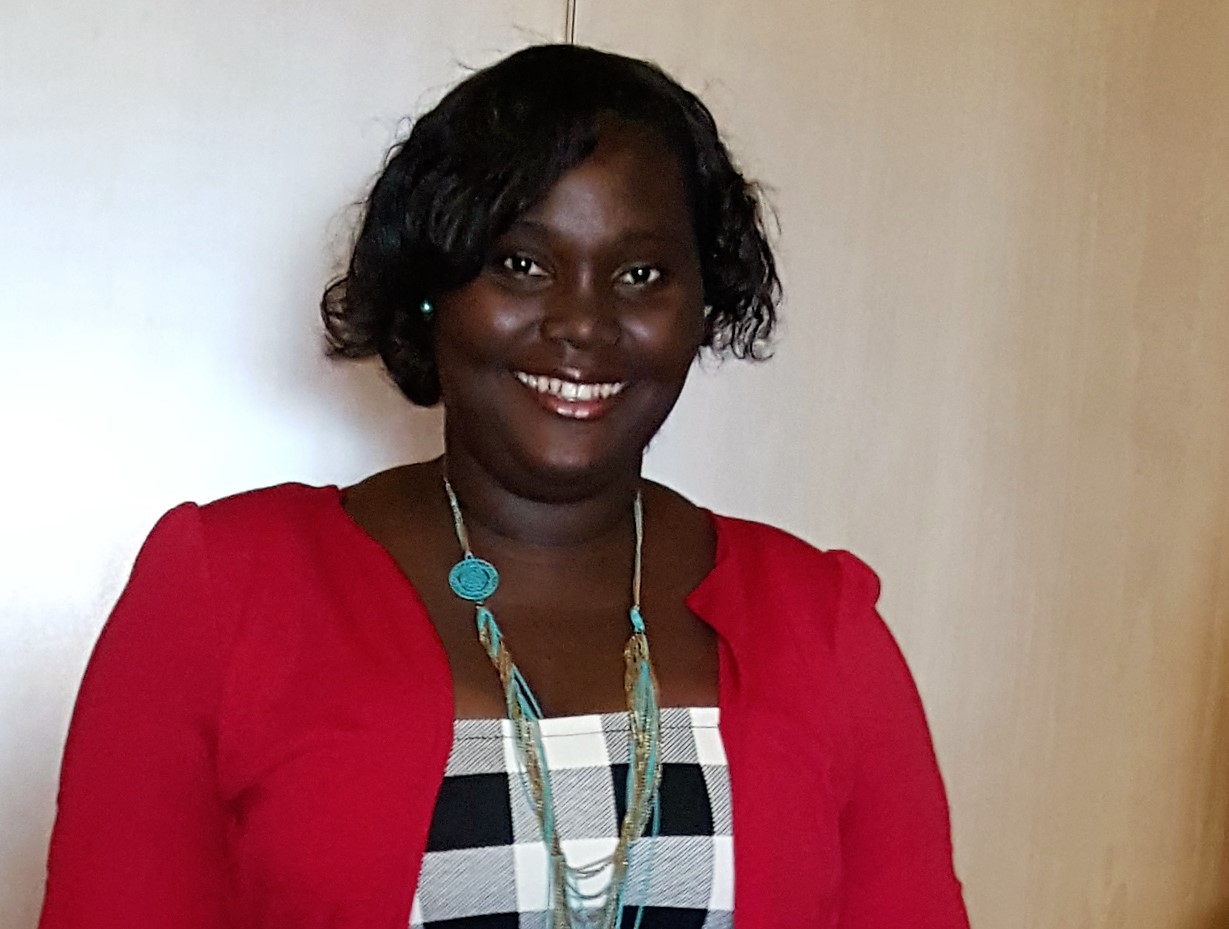 Nakasia is a reporter for the National Communications Network in Guyana. Looking to improve her investigative skills and broaden her contacts, Nakasia used the bursary to travel to Jamaica to attend PMA’s Investigative Journalism in a Digital Age workshop.
Nakasia is a reporter for the National Communications Network in Guyana. Looking to improve her investigative skills and broaden her contacts, Nakasia used the bursary to travel to Jamaica to attend PMA’s Investigative Journalism in a Digital Age workshop.
Reporting back on her experience, Nakasia said: “the workshop was an eye opener as I have never been exposed to such training before and never knew that [a] simple data base can contribute to a wide range of stories, in fact I have seen for myself, first hand, that data base concretes your story, making it credible leaving no room for doubts”.
“This is one workshop I would recommend that any Journalist take up; even if they have been exposed to such training before it would be a refresher.”
The workshop was followed by a five-week online course run by renowned Professor Brant Houston, the current holder of the John S. and James L. Knight Foundation Chair in Investigative and Enterprise Reporting at the University of Illinois.
Balendran Kandeban
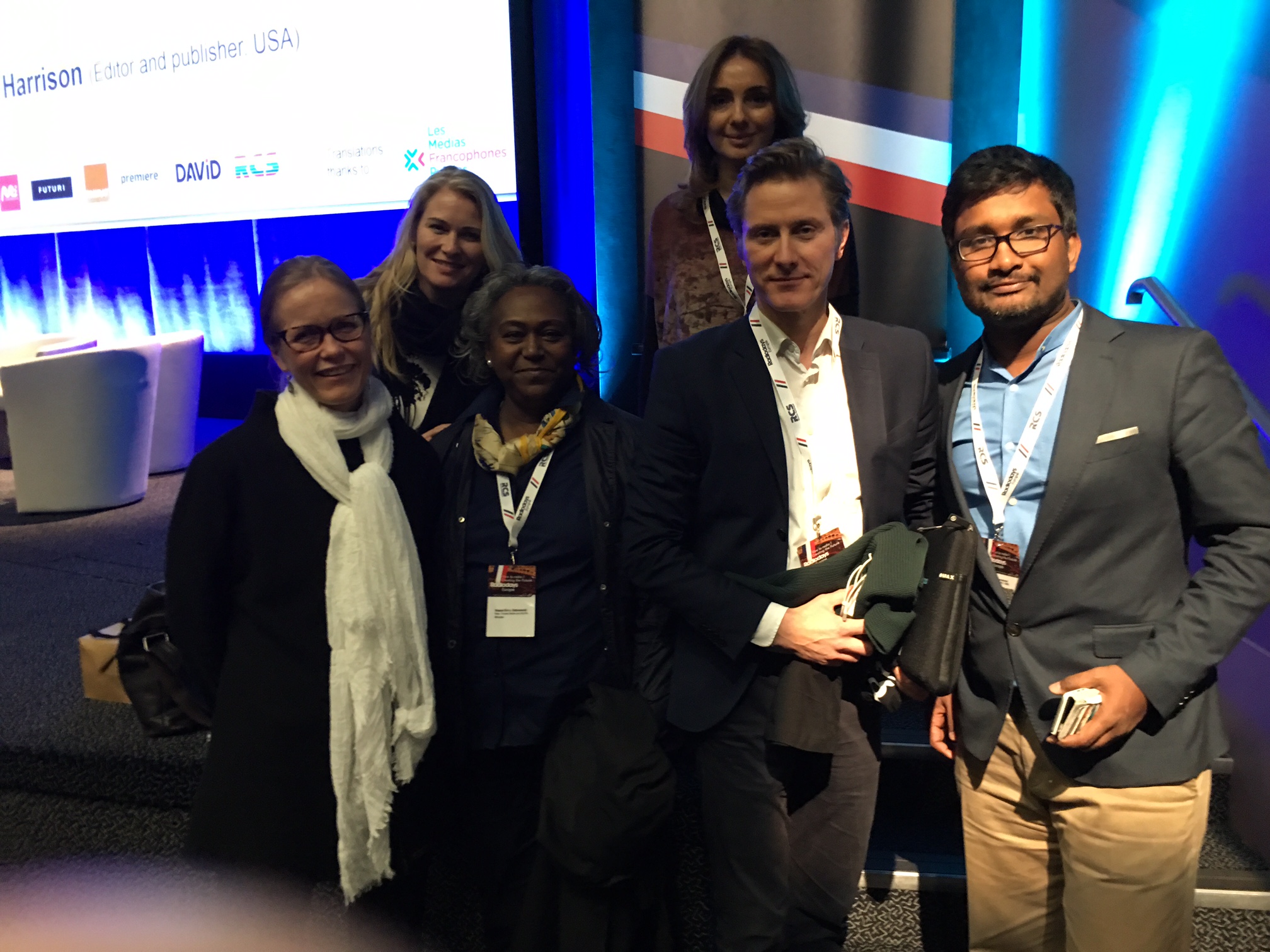
Hailing from MBC Radio Networks, Capital Maharaga in Sri Lanka, Balendran used his bursary to travel to RadioDays Europe in Paris.
He also attended an exclusive four-day Creative Leadership Programme conducted by the Berlin School of Creative Leadership.
“RadioDays and the Creative Leadership Programme were great opportunities for me to listen, connect and network with inspiring broadcasting leaders around the world, share our cases, experiences, knowledge and passion for how to make great radio! And this great opportunity will help me to be a better leader, create opportunities and challenge circumstances way back in my home country to take Sri Lankan radio industry to the next level and create future for radio”.
This was a great opportunity for Balendran to discover what’s new in the world of radio, to connect and discuss with broadcasters across the world on how to create a better future for radio. He has since been able to share his experience and knowledge with colleageues in Sri Lanka.
Nomazulu Mda
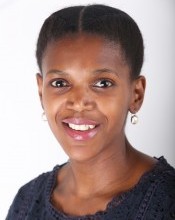 As the Head of Research for the South African Broadcasting Corporation, Nomazulu used her bursary to travel to Ghana to work on developing a toolkit for journalists to collate data from elections.
As the Head of Research for the South African Broadcasting Corporation, Nomazulu used her bursary to travel to Ghana to work on developing a toolkit for journalists to collate data from elections.
Her objective was to spend a week in the newsroom at the Ghana Broadcasting Corporation to observe news gathering, the process of news delivery and the news production value chain. Nomazulu wanted to make these observations infield so to make comparisons with coverage in South Africa.
[bs_collapse id=”collapse_31c8-fc1b”]
[bs_citem title=”Click here to read Nomazulu’s report about her time in Ghana” id=”citem_b8ed-ec1a” parent=”collapse_31c8-fc1b”]
From 30 May to 3 June 2016, I spent five days in Ghana observing how that country’s media prepares for elections coverage. Ghana is due to hold its Presidential elections on 7 November 2016 and the media is poised to play a pivotal role as the country seeks to deepen its democracy in the upcoming election.
The objective of my trip was to conduct a comparative study between Ghana and South Africa and how the two countries’ major media players approach elections coverage. I had intended to spend the entire five-day period at Ghana Broadcasting Corporation; however due to circumstances that prevailed; I altered my programme to include the observation of influential players in media space who also impact on the approach of that country’s public broadcaster. Altering my approach helped me pick up on incidental data that would become useful in my findings.
After conducting a comparative analysis of the manner in which Ghana media approaches elections coverage; I was able to update the SABC’s Elections Handbook (toolkit) for the 2016 Local Government Elections. I added a chapter on best practice drawn from the set of “dos and don’ts” I designed on the basis of my observations in Ghana. The Elections Coverage Handbook is the core of the Elections Coverage Training SABC News is currently rolling out in preparation for the elections on 3 August 2016.
I had initially planned to spend a full week at Ghana Broadcasting Cooperation (GBC), however due to hosting operational constraints experienced ahead of the visit, I had to either choose a different country to visit or alter my programme in Ghana. Due to the fact that significant elections in Africa had already taken place during 2016 – bar Kenya which is due in 2017 – I opted to alter my programme in Ghana to incorporate stakeholder engagements that could still give me insight into the operations or public perceptions about GBC. I carefully identified organisations that study the media landscape in Ghana, particularly GBC; and those that study how political capital in Ghana relates to the GBC. I was able to secure meetings with the Democratic Development (CDD); the Academy of Arts and Science; the Media Foundation for West Africa (MFWA), and the Electoral Commission of Ghana (EC).
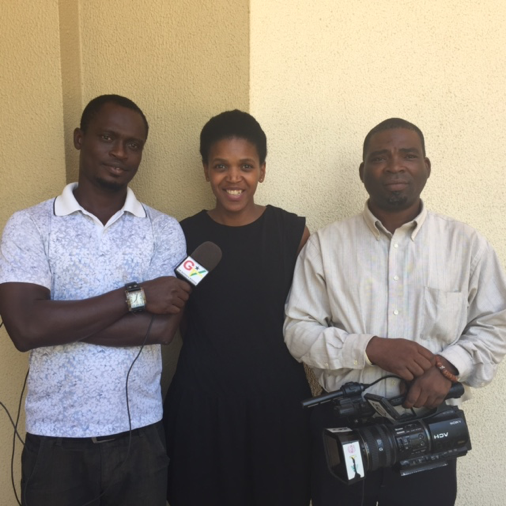
My first meetings were with Prof. Joseph Ayee of the Academy of Arts and Science; and Dr. Franklin Oduro of the CDD. The common outcome of the meetings was a contextual setting of the conditions under which the 2016 elections take place in Ghana and the key electoral issues; and the expected behaviour from the country’s media – public and private – and which of these yield to either of the two main political rivals, the incumbent President Mahama of the National Democratic Congress (NDC) seeking re-election and Dr Akufo-Addo of the New Patriotic Party (NPP). A major concern for both academics was what they termed “abuse of incumbency”, a phenomenon that entails the public broadcaster yielding to the incumbent President John Mahama in both the quantity and tone of stories covered. The meetings provided much needed context on the climate in Ghana as the country moves closer towards elections; and the role of the public broadcaster in covering the story. I did observe some similarities with the challenges that prevail in South Africa, where the same issue would be termed “disproportionate coverage”. In the Ghana setting, however, it appeared there was no legal or regulatory recourse for aggrieved parties or clear guidelines on how broadcast airtime ought to be spread among the political parties.
My second stop was the Ghana Broadcasting Cooperation where I spent two days. During my stay at GBC, I integrated into the radio newsroom; participating in the radio diary meetings; accompanying crews to the field and participating in the story angles. A significant story relating to elections was the story on political party financing; where the debate centred on whether political parties should receive state funding or not for constituency work and campaign activity; as a way of curbing state capture by political funders when their preferred party wins an election. I was impressed by the process of selecting and prioritising the story from the morning diary meeting; the briefing of the reporting crew locating the story in the elections coverage narrative. During my time in the field, I often found the reporters requesting my counsel on which speakers to interview in order to balance their story. I was honoured to be able to give instant feedback and advice; and take part in the design of their questions and follow up questions to the interviewees. Though I did not get to listen to the playout of the story; I did observe the process of debriefing the reporters, which entailed checking if they stuck to brief and any additional elements that were picked up during the course of the story. I was quite pleased with this.

I spent time with the chair of the Elections Committee where I got to discuss the GBC’s elections coverage approach; which carries the tagline “Ghana Wins”. It was very informative to learn of the guidelines and commitments GBC made for itself as elections approach; which were said to be done to ensure that in the highly contested 2016 Presidential elections; Ghana would be the overall winner and that would be the guiding mantra for how GBC approached each elections story in the absence of clear regulatory guidelines or code of conduct by the Electoral Commission.
The third stakeholder I met was the Electoral Commission of Ghana (the EC); where I met with the Deputy Chairman, Mr Sulley Amadu. Mr Amadu had good knowledge of the South African electoral and broadcasting systems so our discussion was mainly on the comparisons between the two countries; and identifying models that work and those that did not. I was satisfied that our discussion focused on the EC’s engagements with Ghana media houses and the GBC in relation to conduct during elections although there was no official code of conduct media houses could sign legally commit to. I also met the chairperson of the Electoral Commission, Ms Charlotte Osei, albeit briefly, who expressed a keen interest in the outcome of my study tour with the aim of drawing lessons for the 2016 Presidential election that country will hold.
The fourth stakeholder I met was the Media Foundation for West Africa; where I had an insightful discussion with Ms Abigail Larbi, Programme Manager for media monitoring. Ms Larbi took me through a thorough monitoring mechanism they use to encourage media houses – and print and radio – to adhere to during election years to promote responsible and non-inflammatory reporting. Our discussion focused mainly on the work the MFWA does with GBC radio and radio news; and it was fascinating to see how civil society can take charge in promoting fair and balanced coverage in the absence of an official regulatory framework. Even more impressive was the extent to which broadcasters even as large and influential as GBC were willing to subject themselves to this non-mandatory form of regulation; a rare phenomenon in the South African setting.
The last stakeholders I met were two community stations, Coastal TV and Radio Peace both based in the Cape Coast region of Ghana. The reason I chose to incorporate the two stakeholders was to observe how smaller players conduct elections coverage; particularly in the regions where GBC has regional bureaus. I noted with interest that generally in the Cape Coast, the GBC had stiff competition from community media. The communities felt more at ease with the community media than GBC; and this was attributed to the citizen journalism approach to reporting as opposed to a parochial approach a large broadcaster like GBC would typically employ.
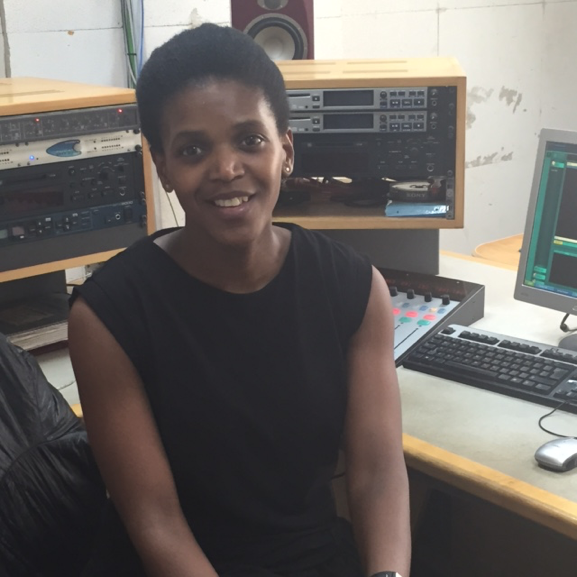
My hosts, specifically the GBC, the MFWA, and Coastal TV, were keen on the SABC’s ElectionsHandbook; the process of designing the handbook with key demographic data in order to derive elections outcomes scenarios. During the course of my meetings, I was able to take them through the chapters of 2016 Elections Handbook and the methodologies used in aggregating the data and preparing it for elections broadcast ahead of and during elections. While they were fascinated by this approach to elections coverage; they acknowledged the importance of advance planning and lamented that they could not replicate the model for the 2016 elections in Ghana given the sheer volume of man hours required to produce an Elections Handbook. They did commit to trial some aspects of the handbook and I am in contact with them to provide some assistance and feedback where required.
I plan to visit Ghana again closer to the elections in November 2016 or during election week. Should my visit be successful, I will be accompanied by one of my colleagues who will join the reporting teams so we can both observe and participate in the coverage process. The follow up visit will enable me to update my initial observations made during the May/June visit; and assess the extent to which preparation plans are adhered to or altered during election week.
My gratitude goes to the Public Media Alliance and the Grace Wyndham Goldie Trust for making my study tour to Ghana possible; the SABC for granting me permission to embark on the study and for providing supplementary funding.
[/bs_citem]
[/bs_collapse]
Colvin Harry
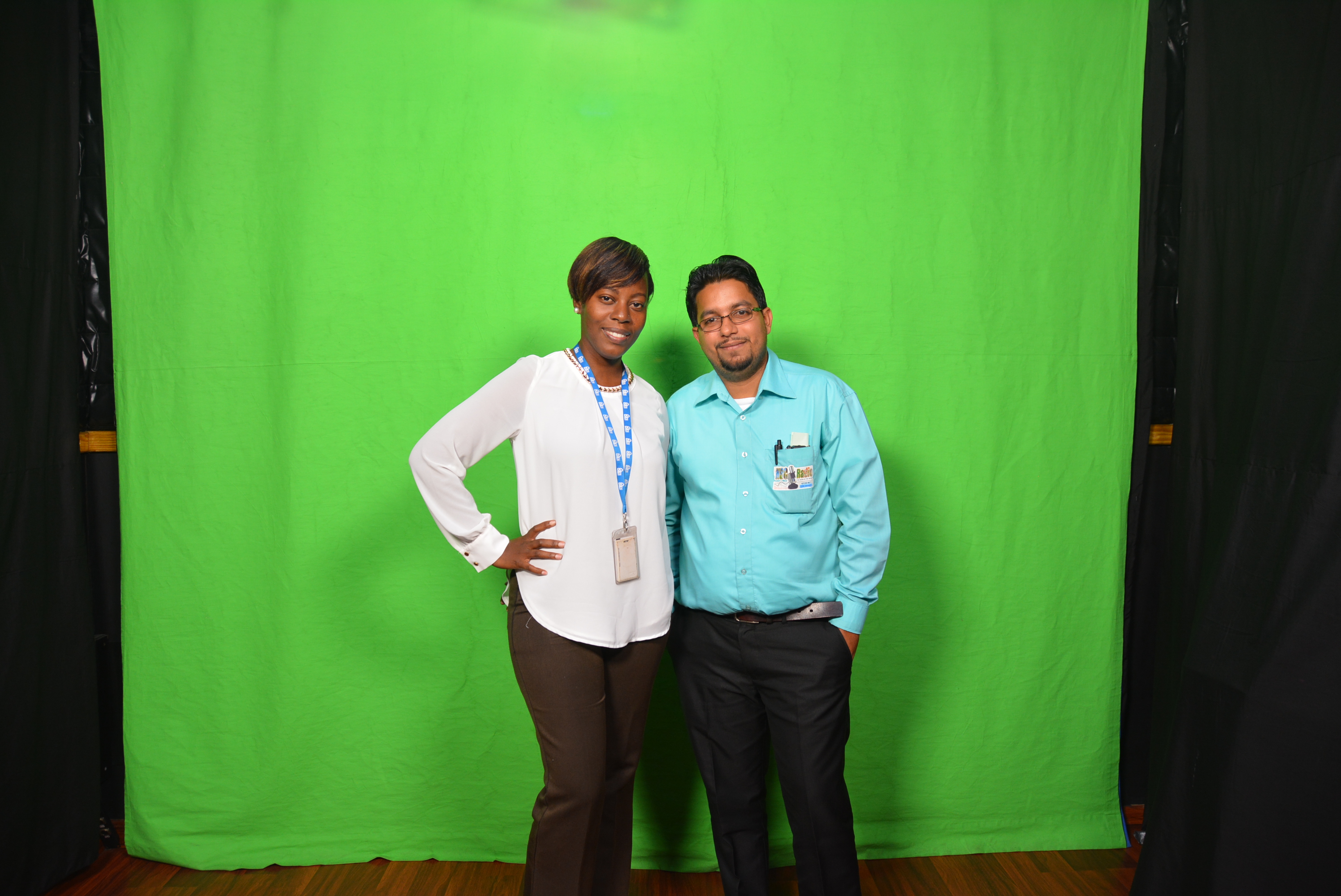
The National Broadcasting Corporation of St Vincent and the Grenadines (NBC) strives to bring diverse content to its listeners, and they have recently established a multi-media unit to target new audiences.
As Programme Manager at NBC, Colvin used his bursary to visit Jamaica, which is recognised as one of the more developed landscapes for new media.
Here Colvin visited RJR and the Education Broadcasting Network to explore how new media can be integrated with traditional broadcast content. According to Colvin the main reason for his visit was “to see how new media is being used to build brand awareness, create educational content and generate revenue”.
Colvin described his visit as a great success, in particular his visit to RJR where he was inspired by RJR’s multimedia division and the role it plays in both generating income and the critical role it plays in maintaining RJR’s online presence. He also took inspiration from their 1spotmedia service, which “brings the content of the RJR Group both radio and television in one easily accessible location via Web and Mobile platforms”.
I returned to my organisation with fresh ideas and a fresh outlook as to what we can achieve with effective use of the cutting edge technology and the multimedia specialists.
“Overall I would say my main objectives were met and I was able to get a greater sense of understanding as to how we can adopt best practices and implement a functional and successful new media unit. I returned to my organisation with fresh ideas and a fresh outlook as to what we can achieve with effective use of the cutting edge technology and the multimedia specialists. I have discovered that even though the new media operations at RJR are not very large they are driven by highly skilled and motivated individuals whose passion is expounded in the quality of the work they deliver. Using the knowledge gained I am now in a better position to see things differently as it relates to the profitability of New Media strategies once executed properly.”
Colvin now hopes to share his experiences with NBC and other local broadcasters as well as apply what he learnt to draw up proposals for a new media unit.
Sharmin Nigar
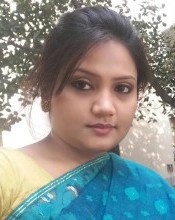 Sharmin is Art Director at Bangladesh Television.
Sharmin is Art Director at Bangladesh Television.
She used the bursary to visit production companies in Singapore and the Broadcast Asia summit to learn about graphic design and branding and their role in the process of programme development, from commissioning to delivery.
Sharmin hoped that that the visit would instill her with new branding ideas to improve the output quality of Bangladesh Television (BTV), which has recently developed a new Branding & Graphics department with the aissistance of the BBC World Service.
[bs_collapse id=”collapse_a4e9-914b”]
[bs_citem title=”Read about Sharmin’s successful visit to Singapore” id=”citem_fcf1-6791″ parent=”collapse_a4e9-914b”]
I spent ten days in Singapore. My vision was to find out how different TV channels think about TV branding and graphics. I visited production houses like Beach house Pictures and Make Productions who works in this area.
Beach House Pictures is Asia’s largest production company that specialises in factual, entertainment and children’s content for the international market. Here I came to know what they produced and how they work for their clients.
Tim Franklin, the production head was my host and was very informative.He showed me documentaries, promotional programmes, computer graphics and also showed me some title animations and briefed me on the theoretical, technical and aesthetic aspects of production.
MAKE Productions is an international media company based in Singapore and London specializing in quality factual programming for leading broadcasters. They produce documentary for Media Corp channel 5.
Sharah Bagharib, Producer/Director of MAKE Productions, is a great personality, I spent much more time there as she briefed me on production details, graphics and virtual studio. I was very happy to be a part of the production of Bloomberg Television. That was a tremendous experience for me to know all of these things first hand.
I was also able to visit Broadcast Asia – 2016 (31 may – 3rd June), which was held in Marina bay Sands. It was a great opportunity for me to see a broad spectrum of broadcast media personnel on a single platform. Whilst at Broadcast Asia I was able to network and explore new broadcast equipment and new technology.
My objective was to know the key thought behind the branding of a television channel and its production, cope with the improvisation and changing trends of television graphics and virtual studio and thus implement this as an Art Director in my organisation and improve its brand value. I also played a role to build an avenue between my organisation and those that I visited.
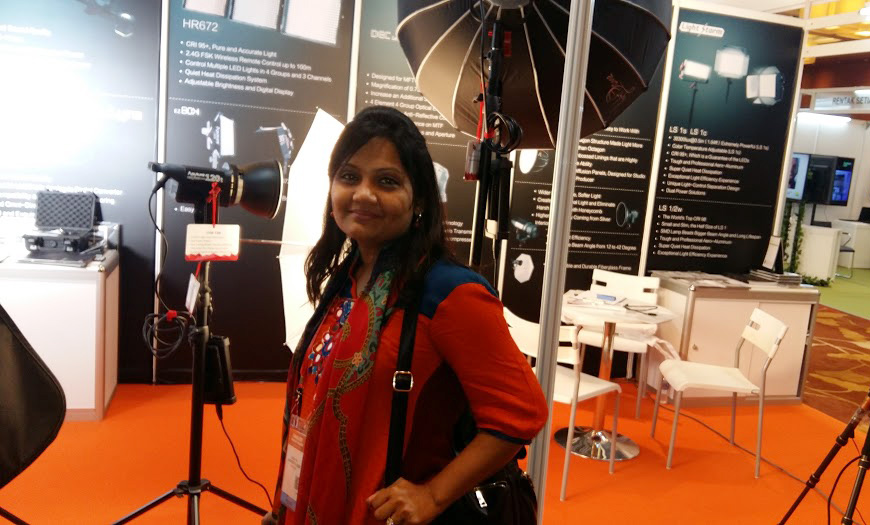
I am very much happy with my experience. The cooperation of the media personnel was excellent and my learning phase was with homely feelings. At first they briefed me and then allowed me to get hands on with production. The activities that took place in Singapore allowed me to achieve my core objectives.
I returned home with a fresh thoughts of production ideas and enthusiasm for creating more graphics in a short time frame. My knowledge regarding virtual studio has definitely improved a lot. BTV is now in a transition period and going to improvise their telecast policy and branding. I am confident that my experience in Singapore will make me a key part of this initiative.
The most important outcome of this activity is my new attitude towards branding, graphics and their role in production.
The most important outcome of this activity is my new attitude towards branding, graphics and their role in production. Now I think positively to build my dream without any difficulties and without barriers. I now know how to make a programme, from its concept to visualization. I learned how to enter deep into a subject. I knew that an audience research is conducted before making a programme branding. It expanded my overall understanding. It changed my previous concepts about the TV graphics and branding. Such knowledge will help me in the field of my professional career. I will share my experience with the management of BTV. Thus my organisation will certainly benefit from my travels.
The bursary was a ‘brain-storming’ exercise for me. It increased my curiosity. Though this type of activity is not sufficient enough to gather a complete and concrete knowledge on a vast subject like TV branding and graphics it added some new dimensions in my thinking. It is, however, necessary for me to learn more about News Virtual Studio, Advance Computer Graphics, and Programme Management Techniques. I knew that there are many things to learn through exchanging ideas, experiences and views. So If I get any training or travel opportunity in the future I will try to avail it. I want to travel to the BBC in London.
I am planning to introduce some things from my learning into programme making. I am sharing my experience with the authority. I am also planning to invite the beach house team & make production team (and other broadcasters) to visit Bangladesh Television (BTV).
I wish to thank the Public Media Alliance, Grace Wyndham Goldie Trust and Bangladesh Television for helping me achieve this great professional opportunity.
[/bs_citem]
[/bs_collapse]
Liisa McMillan
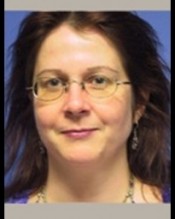 Liisa is a Music Content Editor at Radio New Zealand and is responsible for developing new ways to produce RNZ Music content, and ways for it to reach new audiences.
Liisa is a Music Content Editor at Radio New Zealand and is responsible for developing new ways to produce RNZ Music content, and ways for it to reach new audiences.
Radio New Zealand (RNZ) is in the midst of reimagining its traditional role as New Zealand’s public service radio broadcaster. While retaining its focus on New Zealand current affairs, culture and society, it is evolving into a multimedia storyteller. Liisa spent a week visiting ABC staff in Sydney, Australia who work in similar areas to her role at RNZ, to see how they are approaching the challenges and opportunities presented by digital disruption in the public media space.
Her objective was to compare notes on ways to meet the challenges of evolving from an audio-focused radio broadcaster, to a multi-media, multi-platform, audience-interactive content provider. Liisa also aimed to connect with other public media practitioners to build community, for professional development and the sharing of ideas and tools.
[bs_collapse id=”collapse_d674-c048″]
[bs_citem title=”Read Liisa’s report about her visit to ABC” id=”citem_a4af-341a” parent=”collapse_d674-c048″]
This was an invaluable experience. It was a real pleasure to be welcomed so warmly by “others of my kind” for meeting people face-to-face, at their place of work to connect on a human level, and gain some insight into their aims and methods.
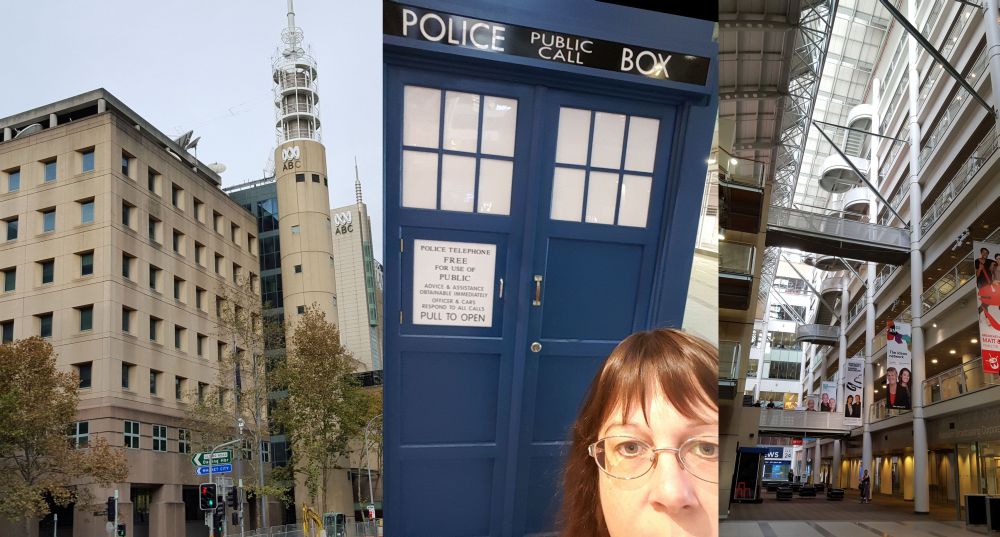 I met ABC people from Radio National Music, Double J, Triple J, Classic FM, Radio News, Metro radio stations and ABC International/digital. While I was focused on music content, the majority of the information I gathered is easily transferable across most aspects of public media.
I met ABC people from Radio National Music, Double J, Triple J, Classic FM, Radio News, Metro radio stations and ABC International/digital. While I was focused on music content, the majority of the information I gathered is easily transferable across most aspects of public media.
We covered a really wide range of topics, from the technical to the philosophical, including the need to be relevant to diverse, fragmented audiences, and how to structure and place our stories so different audiences might engage with them. I also explored how to support (lead) and resource specialist staff (primarily audio producers)to branch out into other forms of storytelling and audience engagement – do you train radio producers/journalists to do everything? Or hire/train digital specialists? ABC is having good results with the latter, RNZ Music has been pursuing the former due to resourcing but seeing the value of this approach within the ABC is causing us to rethink our approach to some current vacancies.
We discussed tools for transparent editorial/project planning to try to improve internal communication and smooth workflows (Google docs, sheets and forms win for now!); with an end goal of entering data once, but have it visible and available in all the formats and places it is needed.
We compared the various software packages we use for content production, and I saw some of the ways the ABC co-ordinates delivery and distribution of content across multiple platforms. The number of ABC outlets, combined with geographical and time-zone complexity means the ABC has had to invest in tools to manage this (e.g. CoreMedia, AIM Rapid). I recommend RNZ investigate these further.
I loved the strong editorial focus on policy (over personality) and the ABC’s role in contributing to public participation in democracy
I really appreciated being invited to an ABC election planning day, which brought all the top TV, radio, digital and social journalists, producers and presenters from ABC outlets across Australia together. While theoretically ‘off-topic’ for a music editor this was a fascinating and completely transferable insight into how a larger organisation approaches co-ordinating the often overlapping – if not competing – needs of multiple news and current affairs outlets, and showed that issues such as internal communication and the challenges of incorporating new digital outlets and social media alongside broadcast are common. At the same time, new tools and strong external partnerships can improve the availability of information both within the organisation as well as to the public (e.g. Vote Compass and Australia Votes). I loved the strong editorial focus on policy (over personality) and the ABC’s role in contributing to public participation in democracy that ran though this day.
We discussed the way the increasing popularity of a widening variety of social media platforms has led to the swift demise of ‘COPE’ – Create Once, Publish Everywhere – and the need to instead rationalise what we can support successfully. The increasing value of audience (and population) research data and analytics. Walking the line between being engaging and relevant, while retaining integrity versus being too populist and ‘clickbaity’. Balancing the expectations of traditional audiences with those of the new audiences who we must also serve to remain relevant probably by retaining the traditional audience via traditional platforms with gradual change to introduce them to new platforms, while seeking to serve new audiences (or communities of interest) in new ways, where they congregate (e.g. social media, partnerships), rather than expecting them to come to us.
I found meeting other people dedicated to the public media vocation to be hugely re-affirming, and inspiring, and I hope my hosts did too
I thought RNZ might be the ‘poor cousin’ to our bigger, better established neighbour, but I found that, overall, we are wrestling with the same challenges and opportunities around the move to multi-media story-telling and audience engagement via multiple platforms, that is, the opportunity to better serve diverse audiences by meeting them were they choose to consume media, versus the challenge of the growing number of formats we need to be excellent at, with reducing funding. This was professionally reassuring to me. It confirmed that RNZ is on the right track, and we are progressing at a reasonable pace. I thought the ABC might have found the silver bullet to solve some of these big issues, but now I see we can share our small wins (and failures), and hopefully work together towards some of the larger goals.
I found meeting other people dedicated to the public media vocation to be hugely re-affirming, and inspiring, and I hope my hosts did too. It was great to be able to talk though shared issues, and possible solutions, and/or plan to follow up on developments in the future. I know from previous visits to other media organisations that these experiences can keep on giving for years to come.
I visited the BBC in 2002, which set me on a path of work which lasted until 2011. May this echo so far! Already my visit has influenced our approach to recruitment and as a follow up I will write a report for the RNZ staff newsletter covering the highlights of my trip, and offering to talk to people about their areas of interest. I will be able to apply some of the information I have learned immediately, for instance increasing the use of Google docs/sheets and introducing Google forms as a way to collate and track editorial planning and manage projects. I will also talk to my team about my experiences encourage them to follow relevant ABC social media channels, see what they are doing well, and emulate some of that.
I will keep in touch with ABC Triple J, Double J, Radio National Music, Classic FM and ABC International about possible content sharing – whether for broadcast or as professional development for staff.
I have already shared a programme of interest to Triple J’s content manager so his staff can have a listen to what we do. ABC Classical and sister station RNZ Concert have an existing occasional live music recording exchange, which I hope will continue and grow. Both stations are also embarking on significant refreshing of their scheduling and playout technology, sound and style, so I expect we will have much to discuss over the coming months.
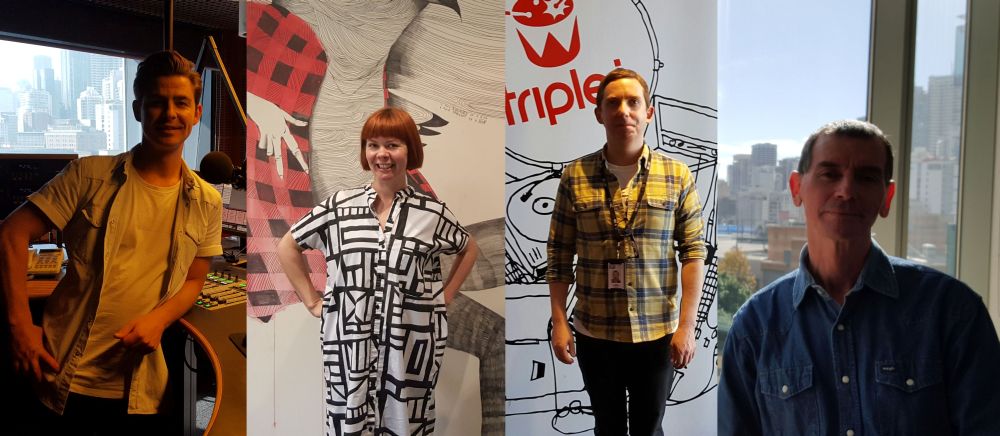
ABC International are interested in exploring the possibility of a co-production with RNZ, aimed at ex-pat Australasians (Approx. one million New Zealanders (about a fifth of the population) live overseas, often alongside Australians). We also share the responsibility to better reflect our increasingly culturally diverse populations. Both organisations are doing work on this.
I hope to be able to keep in touch with the ABC’s upcoming policy discussions around music copyrights in their content on third-party, commercial platforms (e.g. YouTube), which is a growing issue for non-commercial public media organisations.
I hope some of the people I met at ABC might visit RNZ if they come to New Zealand in the future, we would certainly be very happy to show them around and extend some collegial hospitality.
I’d like to express my gratitude to all the people at the ABC who welcomed me, and were so generous with their time and thoughts.
I very much appreciate the vote of confidence and support given to me by the Public Media Alliance and Radio New Zealand in giving me this experience. Not only in financing a trip I would not otherwise have been able to make, but for the time away from my desk which allowed me space to engage in thinking about and discussing these ideas. Thank you.
[/bs_citem]
[/bs_collapse]
Otufelenite Sharon Élone
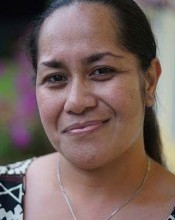 As a producer at the Tonga Broadcasting Commission (TBC), Sharon’s main objective was to use the bursary to improve her production skills in all areas.
As a producer at the Tonga Broadcasting Commission (TBC), Sharon’s main objective was to use the bursary to improve her production skills in all areas.
Armed only with on-the-job training, Sharon visited Sun Pix in NZ to spend 10 days with a team there to gain experience in many fields, particularly in editing, interviewing and camera work. She also observed how she can make more targeted content on issues that affect Tongans.
Reporting on her time at Sun Pix, Sharon commented on the importance of timing in production and the need for a positive, comfortable working environment that encourages mutual understanding: “I see how everything comes together when the team meet to discuss the show for the week. I can see how easy and comfortable it is for everyone to just put their idea on the table and discussion begins ending with the chosen stories for the week. It is essential to have a good and happy working environment in order to produce a good show.”
It is essential to have a good and happy working environment in order to produce a good show
Sharon also noted the difference in creativity between Sun Pix and TBC, having observed the team in action: “I strongly believe that creativity will spice up the tone of production of how we tell the story, whether it be with humour or emotion but at the same time still telling facts”.
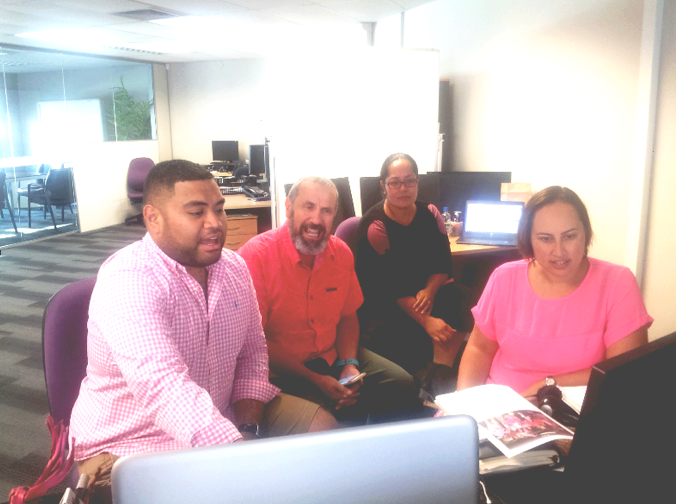
The bursary also gave Sharon the opportunity to observe the production of a 30minute show by Sun Pix’s Tagata Pasifika show. “I was very impressed when going out on shooting, to see how well both reporter and cameraman work on set. This is an area that I need to work on when returning home, as I see that the camera work is the key to creativity when telling the story. In production it is not just a one person or one stage work, it flows from the director/producer to the camera people and end up with the editors.”
In a highlight of her two weeks in New Zealand, Sharon got to go behind the scenes of a Tagata Pasifika live broadcast. “Not only was I impressed by the advanced software technology used as it is very different from the one we use, I was taken to how the whole show come together, and amazed at how the presenters delivered the whole show with the Pasifika flavour that Tagata Pasifika is famous for.”
Sharon plans to implement the skills that she has learnt back at TBC and is positive that the broadcaster will be able to produce “interesting and entertaining” programmes despite having fewer resources.
Richard Purcell
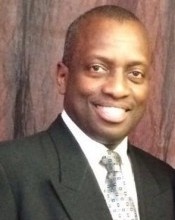 As the General Manager of Gem Radio Five Ltd in Trinidad & Tobago, Richard used his bursary to attend RadioDays Europe to broaden his knowledge of the business of radio, with a specific emphasis on sales, marketing and promotion.
As the General Manager of Gem Radio Five Ltd in Trinidad & Tobago, Richard used his bursary to attend RadioDays Europe to broaden his knowledge of the business of radio, with a specific emphasis on sales, marketing and promotion.
It is hoped that the knowledge acquired will help his organisation to excel in a market that is highly competitive and currently undergoing changes such as mandated digitalisation. Richard also used the conference to learn how best to make public broadcasting more interesting and entertaining to its audience. This is key for the survival of two of his stations – the CSS BVI and WVENT ST. Lucia, where the focus is on educating and informing the public.[bs_collapse id=”collapse_90a0-d57c”]
[bs_citem title=”Read Richard’s report from RadioDays Europe” id=”citem_bea8-c316″ parent=”collapse_90a0-d57c”]
At RadioDays Europe I was afforded the opportunity to learn new, exciting and effective techniques in the business of radio broadcasting and to further understand how to not only exist, but to thrive in this new world – a world where traditional broadcasters are increasingly more challenged by competition from New and Social Media.
My main objectives were to broaden my knowledge of radio in the areas of Sales, Marketing and Promotion with the goal of finding creative ways to increase revenue. Another objective was to learn more about public service broadcasting as we have two stations within our network that would benefit in this area. Therefore, I also sought to attend sessions that would address the Broadcaster’s role in issues such as Climate Change and the Eradication of Poverty.
The sessions I attended on sales, marketing and promotions were to the point and very informative. I left the sessions with new and reinforced ideas, some of which I implemented on return. I however, also learned of the real threat of New and Social Media and how Broadcasters could effectively address these threats. Then there were the sessions that addressed public service broadcasting issues, which had little to do with revenue generation but more with addressing the UN Sustainable Goal issues in ways to attract and keep audience.
I left the sessions with new and reinforced ideas, some of which I implemented on return
The focus on Radio is what makes Radiodays Europe better than other Media Conferences that deal with all mediums. The 50 plus sessions ensured that one could find exactly the topic one wanted addressed and with the interactive nature of most of these sessions, satisfaction was ensured.
Once I returned I met with the Group CEO and shared my experience and the knowledge acquired. I have been mandated to meet with my company’s managers and share all that I have learnt but more importantly I have almost completed a presentation, which I will present to Managers in other companies within the Group. I have also purchased the videos of all the conferences, which I am using as support for my presentation.
More pointedly, I have begun to put together a project whereby my company’s radio stations will be the first in its territories to provide Radio on Demand. All of the content of each station will be made available on demand. This goes beyond simple podcasting which some of the other stations already offer. At the sessions, I was able to further understand and appreciate, that implementing this project will give my stations the competitive edge needed to excel in a market with reduced advertising capacity.
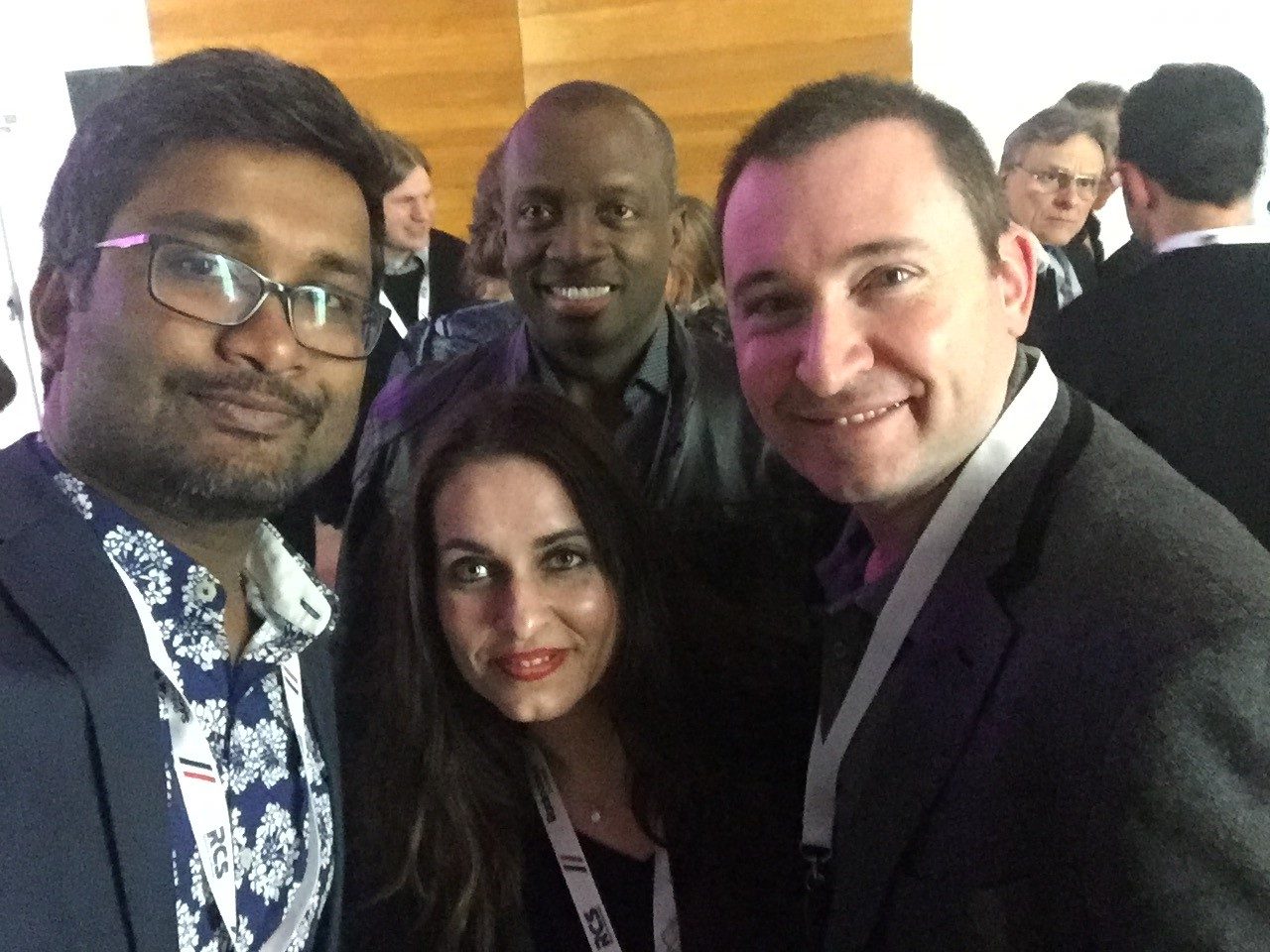
By attending the conference sessions as well as a workshop, which gave me the ideas that I was able to take back to my company and execute. But also, I benefitted by having the opportunity to meet and mingle with my peers across Europe as well as some who are considered to be Gurus in their respective fields. This was indeed priceless!
Since coming back I have been speaking to two equipment suppliers who I met at the event with the hope of them doing business with us in the Caribbean. One is the creator of software for Podcasting/Radio on Demand, a project that I plan to implement. This supplier has not done business in this part of the world and so is very interested in making a presentation to my company.
This experience at Radiodays Europe has certainly opened my eyes further to the need of keeping abreast of changes within the industry by interacting with the stakeholders.
The dynamics of Radio are changing rapidly and whereas one may be able to get some idea of change through the internet, via news or through other traditional means, the sharing of information by other radio media practitioners in an environment such as Radiodays Europe cannot be discounted.
I have therefore encouraged my fellow managers to pursue similar and other learning opportunities by accessing bursaries through the PMA or other organisations to which we are affiliated.
[/bs_citem]
[/bs_collapse]
Marcus Tyley
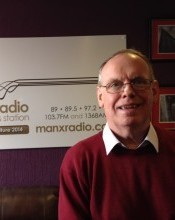 Marcus is the Controller of Programming and Content at Manx Radio. Our bursary allowed him to share his knowledge and experience with Radio Montserrat – a similar small island station to his on the Isle of Man.
Marcus is the Controller of Programming and Content at Manx Radio. Our bursary allowed him to share his knowledge and experience with Radio Montserrat – a similar small island station to his on the Isle of Man.
Marcus also proposed to produce a feature length documentary on the visit, comparing and contrasting a wide range of aspects of life between the two islands. While in Montserrat, Marcus also proposed to offer training in appropriate areas and compile a detailed study comparing their station with Manx Radio and their audience interaction.
[bs_collapse id=”collapse_5bb0-16cc”]
[bs_citem title=”Read about Marcus’s experience in Montserrat” id=”citem_f924-78cc” parent=”collapse_5bb0-16cc”]
I have been training radio personnel around the world for many years with various other organisations and was available to undertake training and offer my experience to other broadcasters.
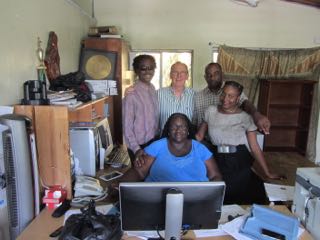
I first opened a dialogue with Herman Sargeant the General Manger of Radio Montserrat and discussed my proposal of training and producing a documentary. We discussed the training needs and arrived at some main headings for the training that was to be delivered in group seminars and one to one sessions.
The following are the main areas that Herman wanted me to look at with the team at Radio Monserrat.
In the group sessions we were to focus on:
- Engaging the audience
- Adding features and ‘spice’ to programmes
- Working with commercial partners and monetizing features
- Presentation technique
- Keeping the whole station in focus not just your own programme
In the one to one sessions we were to look at:
- Reviewing individual programmes.
- Voice coaching
- The individual presentation style.
- Making the most of their time on air
The main overall objectives were to add engaging content to the programmes and increase revenue through advertising and sponsorship.
The initial group seminar was opened by Mrs Camille Gerald, Permanent Secretary to the Office of the Premier for Montserrat, who welcomed me and urged the team to get as much out of the training as they could.
I used a mixture of Powerpoint presentations, practical exercises and personal engagement whilst also reviewing their programmes and features, particularly in the one to one sessions.
After the first two full morning group seminars it became clear that we would need all the available time to meet the high demand for the one to one sessions.
Thirteen individual sessions were scheduled for the last three days of the visit.
The staff appeared very keen to try out the new ideas and features we talked about. They seemed very enthusiastic and receptive to making changes and refinements both in the content and delivery of their programmes and features.
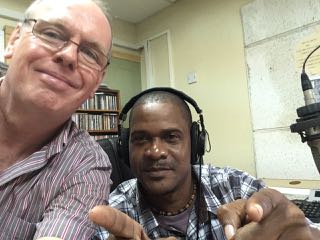
I heard some evidence of this immediately following our sessions.
I believe that many of the presenters will now have new features and additional content in their programmes and have the confidence to deliver them in an engaging way.
As there is no dedicated sales team at Radio Montserrat to seek out advertising and sponsorship, it is up to everyone to try to bring in additional revenue from their programmes.
We talked through how a sales team on a larger station would normally approach a potential client and how the enthusiasm from the presenters themselves could be a real bonus in ‘selling the sizzle’ of the station rather than a hindrance.
Several of them thought of new potential advertisers during our one to one sessions and are already setting up meetings with them. I will be keeping in touch with Herman Sargeant on email and with their lead presenter, Basil Chambers, on email and social media.
I have already produced a new ‘Birthday Request’ bed for Basil with a new sting and he is now using this instead of the full length Stevie Wonder track ‘Happy Birthday’ that he used to play in full each morning before 7.00am.
In the next few weeks I will be looking at how we might get a sonic logo for the station and some new station imaging made with little or no expenditure.
As I am also a trained musician I have written a few possible sonic logos for them that I will send over and then suggest that they use local musicians to record some fresh station imaging and jingles. This is certainly needed and would help to bind the station together as a whole.
In addition to the training work I delivered there I am also making a documentary about Montserrat for Manx Radio.This will feature some unexpected and fascinating Manx connections as well as comparisons between the two islands that I discovered there.
As well as covering the devastating impact of Hurricane Hugo in 1989 and the volcanic eruption of 1995 it will also look at the impact that the late Sir George Martin had on the Island both during the time he operated Air Studios there and also his considerable philanthropic work after the Hurricane and the volcanic eruptions, when he helped to raise millions of pounds for the rebuilding of the island, including the construction of the new Cultural Centre.
My thanks to PMA and the Grace Wydham Goldie Fund for giving me this opportunity.
[/bs_citem]
[/bs_collapse]
Owen Leitch
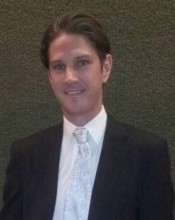 As a bilingual (English/French) news producer for CBC/RadioCanada, Owen used his bursary to visit Cameroon’s CRTV to observe how a fully bilingual broadcaster operates and develop working relationships with those in their television newsroom.
As a bilingual (English/French) news producer for CBC/RadioCanada, Owen used his bursary to visit Cameroon’s CRTV to observe how a fully bilingual broadcaster operates and develop working relationships with those in their television newsroom.
Like CBC/Radio Canada, CRTV is a public broadcaster providing programming in both English and French. Owen’s main objective was to observe how television newscasts are prepared on a daily basis at CRTV headquarters in the capital Yaoundé.
This led Owen to spend two weeks inside the CRTV newsroom, with an aim to shadow the senior editorial team as they built their bulletins. Of particular interest to him was how the assignment process works for reporters, particularly in the field.
[bs_collapse id=”collapse_748e-040a”]
[bs_citem title=”Read Owen’s fascinating report in full” id=”citem_0eb6-4ea2″ parent=”collapse_748e-040a”]
I focused my 10-day trip to Cameroon on observing how CRTV serves its diverse audience by broadcasting in both English and French on the same network.
As a television producer working at CBC RadioCanada, I was able to compare and contrast their model with our own, from editorial meetings, to the control room and even into to the field. As I learned, CRTV’s approach to bilingual integration holds lessons for Canada. It was also an opportunity to build new relationships and contacts with working journalists in the region.
My objectives during my time at CRTV were threefold: observe how a truly bilingual broadcaster operates, further my understanding of civil society and media in Cameroon, and witness how an African broadcaster is adapting to the digital age.
With regards to my first objective, I was left with the distinct impression that what CRTV achieves on a daily basis is quite a feat, and perhaps unique in the world of broadcasting. Unlike at CBC/RadioCanada, where the French and English language services are separate, bilingual integration at CRTV means shared resources, shared programming and shared personnel. The channel produces 6 half hour news bulletins a day. Two are in French, two are in English and the remaining two bulletins are bilingual. The two bilingual bulletins were fascinating to watch, both on air and during production. Bilingual bulletins are presented by two anchors, each speaks one language during the broadcast. They will alternate introducing various topics and reports, without repeating or translating each other. For instance, an English anchor may introduce a report and the French anchor will carry on to another topic.
I was surprised and impressed to see the level of commitment to bilingualism at CRTV, but also in Cameroon more generally
The assumption is that the audience will be able to follow most of, if not everything, that is said in either language. Even on-set guests are interviewed by both anchors, in their respective language. If the guest is not comfortable answering in both languages, they have the option of sticking with their preferred language. As a bilingual producer and journalist myself, I’ve never witnessed anything like it. Also, I was able to work with reporter teams in the field on three separate occasions and here too, CRTV goes to great lengths to report in both languages. Two reporters will be assigned the same story, one files in English, the other in French. Interviews are conducted in whatever language the interviewee prefers. Each reporter writes and cuts their own version, using the same material and dubbing clips where necessary. It’s not as clunky as it sounds and interesting to see where either reporter goes with the story. I was surprised and impressed to see the level of commitment to bilingualism at CRTV, but also in Cameroon more generally.
With regards to my second objective, my 10 days in Cameroon were very revealing. I knew from the outset that Cameroon’s politics have been controlled by the same President for 34 years. Officially, freedom of the press is allowed in the country, but in practice, the most vocal opponents of the dictatorship are often silenced. Private newspapers do print critical views, but CRTV is a government broadcaster, and as such, self-censorship is a daily reality for reporters there. I witnessed at least one such example myself, when a reporter chose not to air a clip of a woman who was highly critical of the Ministry of Labour. According to the journalist, airing such a clip would embarrass the Ministry and undoubtedly result in some form of reprimand. The reporters I met at CRTV are all professional and principled journalists who are aware of the editorial challenges they face, and do their best to serve the audience within those limitations.
On my third objective, I was able to observe that journalists at CRTV are working with ageing equipment and the move to a digital landscape is just beginning. Many journalists do not have smartphones, and social media tools such as twitter and Facebook are not heavily used to gather or disseminate information. That being said, efforts are being made to revamp CRTV’s website, and TV bulletins are uploaded to the existing site. Ownership of regular portable phones is high across the country, and I was left with the impression that Cameroon’s media landscape must be on the cusp of a digital transformation. Better and more reliable access to wifi is likely the first hurdle. As digital journalism increases in the country, it will be interesting to see how the government responds and if it attempts to clamp down on dissent online.
This experience has given me a rare opportunity to share ideas with working professionals at another publicly owned bilingual broadcaster
This experience has given me a rare opportunity to share ideas with working professionals at another publicly owned bilingual broadcaster. Thanks to my 10 days at CRTV, I was able to exchange ideas with, offer advice to, and learn from my Cameroonian colleagues. I have made lasting friendships and professional connections as a result. I am proud to work for a public broadcaster in Canada, and I really enjoyed observing how Cameroonian journalists with a public mandate reflect their country to their audience. As I mentioned as well, it was an invaluable opportunity to observe how an African broadcaster is adapting to the digital age.
The ultimate outcome of the activity was that I was able to bring back my observations on how a bilingual broadcaster operates in central Africa and share them with my colleagues in Canada. I will be offering my colleagues at CBC a formal presentation of my trip next month, and plan to tell them about the Public Media Alliance and its goals as well. While I don’t imagine a truly bilingual format across the board such as I witnessed at CRTV is coming to CBC/RadioCanada anytime soon, I do think we should explore some bilingual content more closely, especially online. Perhaps a digital version of a bilingual newscast would be something to consider at CBC. There is definitely an audience for bilingual content in Canada, and I learned from CRTV that creating such content is both doable and affordable with the right team and training. Bilingual news production does not necessarily mean twice the staff. It means creating a team of experienced journalists with the language skills to serve both audiences.
I learned so much during my stay, and not only about CRTV. During my 10 days I was able to expand my knowledge of Cameroon as well as the media landscape in central Africa. Furthermore, by participating in daily editorial meetings and by being present in the control room and the field, I was able to impart some of my knowledge as well. I was regularly called upon to offer my assistance and perspective, and I believe my presence was beneficial for my hosts as well.
As mentioned above, the benefits to me were many and I am convinced the experience has made me a better journalist, with a more in depth understanding of how journalism is conducted at CRTV. I was given the opportunity to voice a sports package for their popular sports show as well, which is a cherished addition to my demo reel. And I am confident that the learning went both ways. I believe my biggest contribution to journalists at CRTV was to offer them my opinion and perspective on how they crafted their reports. Whenever possible, I would subtly suggest an approach to the story that put the focus on the human element, that framed things for a national audience, or that made the best use of the sound and pictures available. I had hoped to explore digital journalism with them a bit more, but as mentioned above they are still primarily operating on the traditional TV platform.
Next month I will be offering my colleagues at CBC a presentation of my time in Cameroon during which I will share with them my insights and learning. It is my hope to raise awareness of the Public Media Alliance so that more will apply for travel bursaries in future. While in Cameroon I also stressed to journalists at CRTV that they too should apply for these valuable bursaries, and encouraged them to come visit CBC/Radio Canada in Toronto. It was important to me that they understand this opportunity is available to them as well. I have also remained in contact with a handful of CRTV journalists since my departure, and fully intend to maintain those contacts for years to come. I wish to thank the PMA and the BBC Grace Goldie Fund as well as CRTV and CBC for facilitating this experience. As for my hosts, the CRTV journalists working tirelessly every day to tell the stories that matter, I can never thank them enough for their patience and generosity with me. If they ever come to Canada and CBC, I intend to return the favour.
[/bs_citem]
[/bs_collapse]
Related Posts
9th March 2016
Meet our 2016 broadcast travel bursary recipients
We are pleased to announce the names…
